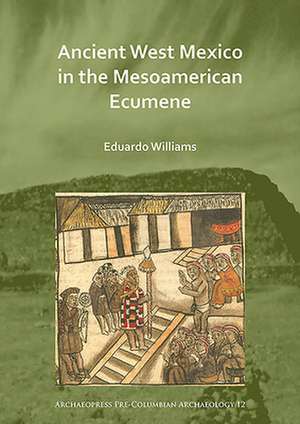Ancient West Mexico in the Mesoamerican Ecumene: Archaeopress Pre-Columbian Archaeology
Autor Eduardo Williamsen Limba Engleză Paperback – 30 ian 2020
The book presents a long-overdue synthesis and update of West Mexican archaeology aimed at scholars, students and the general public. Ancient West Mexico in the Mesoamerican Ecumene is the first book about West Mexican archaeology written by a single author. Another unique feature of this book is that it follows a holistic approach that includes data and perspectives from sociocultural anthropology, ethnohistory, ethnoarchaeology, and general analogy with many ancient cultures within the Mesoamerican ecumene and beyond (including several of the Old World). The focus of interest is the relationship between West Mexico and the rest of the ecumene, and the role played by the ancient West Mexicans in shaping the culture and history of the Mesoamerican universe.
Ancient West Mexico has often been portrayed as a 'marginal' or 'underdeveloped' area of Mesoamerica. This book shows that the opposite is true. Indeed, Williams convincingly demonstrates that West Mexico actually played a critical role in the cultural and historical development of the Mesoamerican ecumene.
Preț: 436.45 lei
Preț vechi: 474.41 lei
-8% Nou
Puncte Express: 655
Preț estimativ în valută:
83.54€ • 90.77$ • 70.22£
83.54€ • 90.77$ • 70.22£
Cartea se retipărește
Doresc să fiu notificat când acest titlu va fi disponibil:
Se trimite...
Preluare comenzi: 021 569.72.76
Specificații
ISBN-13: 9781789693539
ISBN-10: 1789693535
Pagini: 400
Dimensiuni: 205 x 290 x 25 mm
Greutate: 1.61 kg
Editura: ARCHAEOPRESS
Seria Archaeopress Pre-Columbian Archaeology
ISBN-10: 1789693535
Pagini: 400
Dimensiuni: 205 x 290 x 25 mm
Greutate: 1.61 kg
Editura: ARCHAEOPRESS
Seria Archaeopress Pre-Columbian Archaeology
Descriere
This volume presents a long-overdue synthesis and update on West Mexican archaeology. Ancient West Mexico has often been portrayed as a 'marginal' or 'underdeveloped' area of Mesoamerica. This book shows that the opposite is true and that it played a critical role in the cultural and historical development of the Mesoamerican ecumene.


